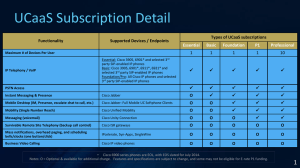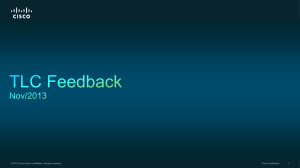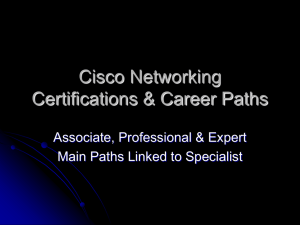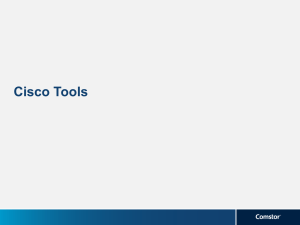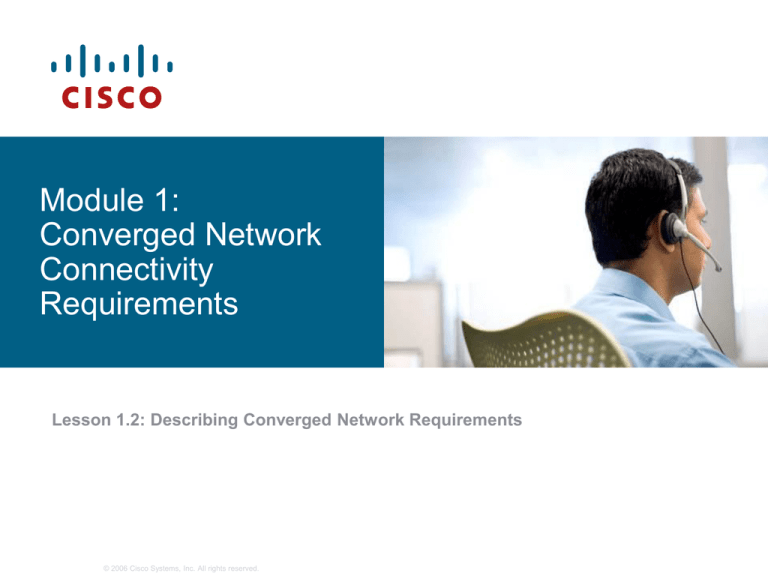
Module 1:
Converged Network
Connectivity
Requirements
Lesson 1.2: Describing Converged Network Requirements
© 2006 Cisco Systems, Inc. All rights reserved.
Objectives
Explain the Cisco conceptual network models, such as
Cisco Enterprise Architecture and Cisco hierarchical
network model.
Describe the traffic conditions in a converged network.
Describe the IIN and the SONA framework.
© 2006 Cisco Systems, Inc. All rights reserved.
Traditional Hierarchical Model
© 2006 Cisco Systems, Inc. All rights reserved.
Cisco Enterprise Architecture
© 2006 Cisco Systems, Inc. All rights reserved.
Campus Architecture
Campus Architecture combines a core infrastructure
of intelligent switching and routing including:
IP Communications
mobility
advanced security
© 2006 Cisco Systems, Inc. All rights reserved.
Data Center Architecture
The Data Center is a cohesive, adaptive network
architecture supporting:
requirements for consolidation
business continuance
security
© 2006 Cisco Systems, Inc. All rights reserved.
Branch Architecture
The Branch allows enterprises to extend head-office
applications and services including:
security
IP communications
advanced application performance supporting
thousands of remote locations/users
© 2006 Cisco Systems, Inc. All rights reserved.
Teleworker Architecture
Teleworker architecture allows enterprises to securely
deliver voice and data services to remote, small or
home offices.
© 2006 Cisco Systems, Inc. All rights reserved.
WAN Architecture
WAN architecture offers the convergence of voice,
video and data services over a single IP
communications network.
© 2006 Cisco Systems, Inc. All rights reserved.
Example: Enterprise Network
© 2006 Cisco Systems, Inc. All rights reserved.
Network Traffic Mix and Requirements
Converged network traffic mix:
Voice and video traffic
Voice applications traffic
Mission-critical applications traffic
Transactional traffic
Routing update traffic
Network management traffic
Bulk transfer (best-effort) and scavenger (less-than-best-effort)
traffic
Key requirements:
Performance (bandwidth, delay, and jitter)
Security (access and transmission)
© 2006 Cisco Systems, Inc. All rights reserved.
Example: Integrated Services in a Converged
Network
© 2006 Cisco Systems, Inc. All rights reserved.
Intelligent Information Network (IIN)
IIN integrates networked resources and information
assets.
IIN extends intelligence across multiple products and
infrastructure layers.
IIN actively participates in the delivery of services and
applications.
© 2006 Cisco Systems, Inc. All rights reserved.
Phases of IIN
Three phases in building an IIN are:
Integrate transport
Integrate services
Integrate applications
© 2006 Cisco Systems, Inc. All rights reserved.
Cisco SONA Framework
Cisco SONA is an architectural framework.
Cisco SONA brings several advantages to enterprises:
Outlines how enterprises can evolve toward the IIN
Illustrates how to build integrated systems across a fully
converged intelligent network
Improves flexibility and increases efficiency
Cisco provides an extensive product line, services,
proven architectures, and experience to help the
enterprises achieve their business goals.
© 2006 Cisco Systems, Inc. All rights reserved.
Cisco SONA Layers
© 2006 Cisco Systems, Inc. All rights reserved.
SONA—Networked Infrastructure Layer
The goal is “anywhere/anytime connectivity.”
© 2006 Cisco Systems, Inc. All rights reserved.
SONA—Interactive Services Layer
Interactive services includes:
voice and collaboration
services
mobility services
security and identity services
storage services
computer services
© 2006 Cisco Systems, Inc. All rights reserved.
application networking services
network infrastructure
virtualization
services management
adaptive management services
SONA—Application Layer
Application Layer includes:
business applications
collaboration applications
© 2006 Cisco Systems, Inc. All rights reserved.
Self Check
1. What are the 3 building blocks of the hierarchical
model?
2. Describe the special needs of voice and video traffic.
3. What types of traffic could be considered best-effort
and less-than-best-effort?
4. What is AON?
5. What are the 3 layers of SONA?
© 2006 Cisco Systems, Inc. All rights reserved.
Summary
The traditional three-layer hierarchical model no longer
completely meets the needs of large converged
networks carrying voice, video, and data. IIN aligns IT
resources with business priorities.
Cisco Enterprise Architecture and SONA provide a
framework for deploying converged networks.
Dealing with complex traffic mixes is a key feature of
Cisco Enterprise Architecture. The Service layer of
SONA addresses the performance and security
requirements of converged networks.
IIN aligns IT resources with business priorities.
Cisco SONA provides an evolutionary path to IIN.
© 2006 Cisco Systems, Inc. All rights reserved.
Q and A
© 2006 Cisco Systems, Inc. All rights reserved.
Resources
Business Overview of Cisco SONA
http://cisco.com/en/US/netsol/ns340/ns394/ns431/networking_s
olutions_white_paper0900aecd803efff3.shtml
What is IIN?
http://cisco.com/en/US/netsol/ns650/networking_solutions_mark
et_segment_solution.html
Enterprise Architectures Poster
http://cisco.com/application/pdf/en/us/guest/netsol/ns477/c643/c
dccont_0900aecd802843ce.pdf
© 2006 Cisco Systems, Inc. All rights reserved.
© 2006 Cisco Systems, Inc. All rights reserved.





